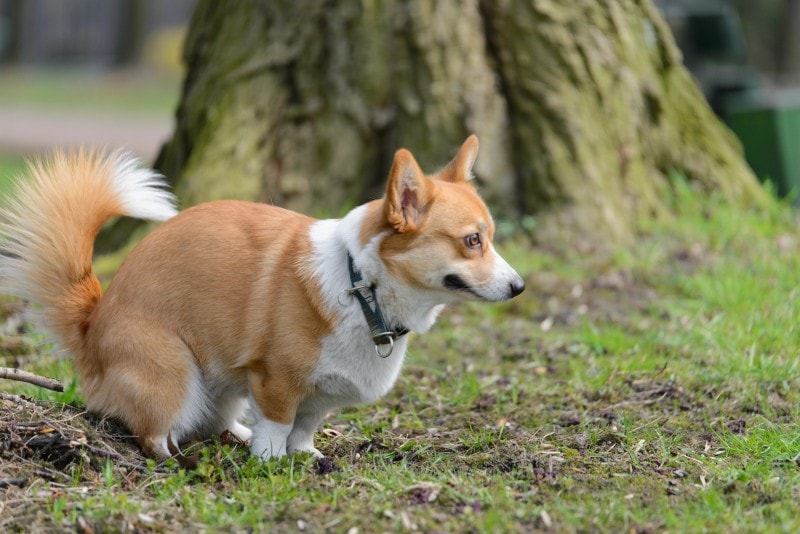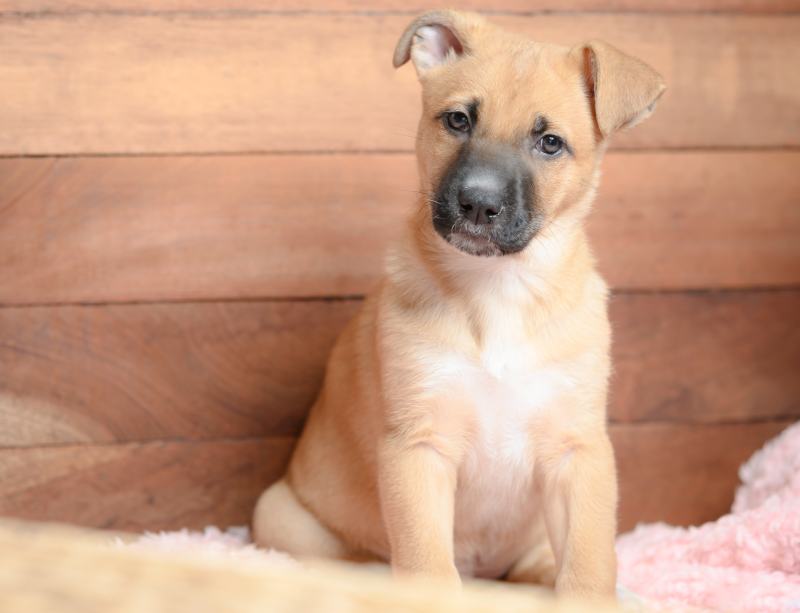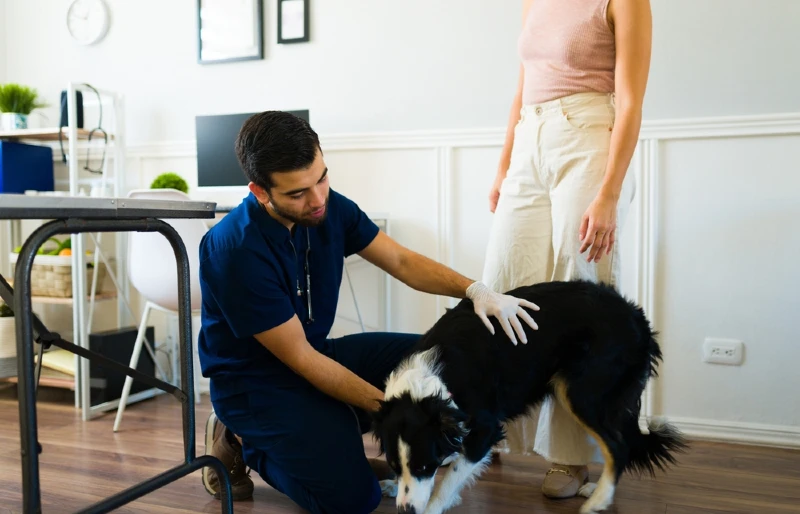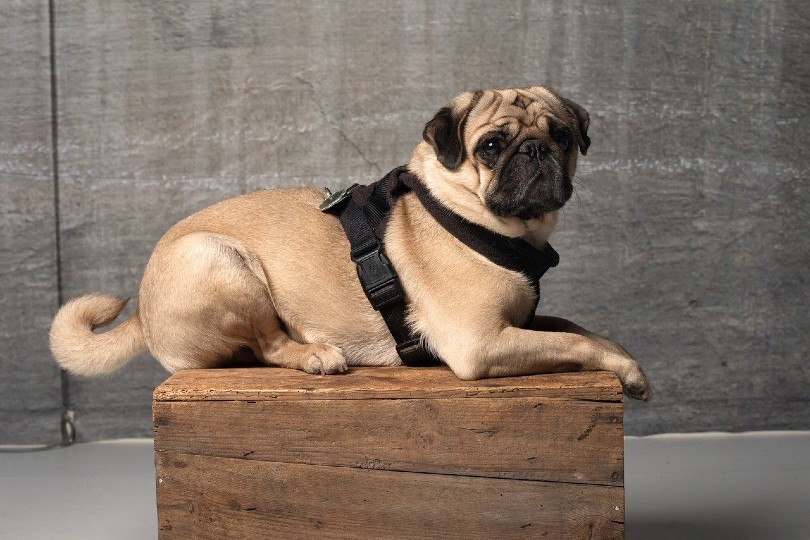How Long Can a Dog Go Without Pooping? Healthy Schedule Explained
By Jordyn Alger
Updated on

Click to Skip Ahead
Dog poop isn’t something many people want to fixate on, but it is an important part of understanding your dog’s current state of health. In general, healthy adult dogs poop once or twice per day. Still, if your dog doesn’t defecate one day and is well in themself otherwise, that is not usually a cause for concern. However, if your dog is straining but unable to poop, that is a concern. After 48 hours, you must call a vet.
In this article, we’ll discuss a dog’s regular pooping schedule and list possible reasons that your dog may not be pooping regularly.
How Long Can a Puppy Go Without Pooping?
If you have a young puppy, his pooping schedule will look much different than the average adult dog’s schedule. Puppies poop much more than older dogs since they have smaller intestinal tracts that process food more quickly. As a result, puppies may poop five or six times per day. Some may even go potty more often than that.
As your dog matures, the frequency with which he needs to go potty gradually decreases. Below is a chart to show the general progression of your puppy’s potty schedule.
| Puppy’s Age | How Often Your Puppy Goes Potty |
| 2 weeks | After every feeding |
| 12 weeks | 4 times each day |
| 6 months | 3 times each day |
| 1 year | 3 times or less each day |
Around 1 year old, your dog will have reached his regular potty schedule. This is the time for you to note his regular pooping schedule so that you can account for any irregularities in his routine and closely monitor his health. If you notice any sudden shifts in routine, reach out to your veterinarian.

How Long Can a Senior Dog Go Without Pooping?
As your dog ages into a senior, his pooping schedule will likely change. Older dogs typically defecate once per day, sometimes even less.
If you are unsure whether your dog is considered a senior, you can make an appointment with your vet to determine how old he is. If you know your dog’s age, you can determine whether or not he is a senior by taking a look at the chart below.
| Dog Breed Size | Senior Age Cut-Off |
| Small Dogs | 11–12 years |
| Medium Dogs | 10 years |
| Large Dogs | 8 years |
| Giant Dogs | 7 years |
Should You Worry About Changes to Your Dog’s Pooping Schedule?
Knowing your dog’s regular pooping schedule will help you decide whether or not something is wrong. If your dog regularly poops twice per day and then suddenly stops, the abrupt change in consistency should alert you that something is amiss.
One day with a changed schedule is usually nothing to worry about. However, if the change lasts more than one day, you should contact your vet.

Why Your Dog Is Not Pooping
Most often, dogs that are not pooping are struggling with constipation. Dogs experiencing constipation will often strain to poop, and if they can poop, the stool will be small and hard. Your dog may experience pain as he tries to pass it. This condition can range from mild to severe. Older dogs are more prone to constipation but it can be seen in any age and breed of dog.
What Causes Constipation in Dogs?
- Ingestion of an indigestible item
- Poor diet, especially diets that are low in fiber
- Sudden diet change
- Increase in stress (especially when caused by new routines, surroundings, or family dynamics)
- Lack of exercise
- Matted fur covering the anus
- Arthritis
- Abscess on the anal gland
- Medications
- Pain that impedes defecation
There are several medical conditions that could cause your dog to experience constipation. If you believe that your dog is suffering from constipation, make an appointment with your vet as soon as possible to ensure that there is no underlying health complication causing constipation.
Signs of Constipation in Dogs
Straining to defecate is one of the easiest signs of constipation to spot. However, it can sometimes be confused with straining to urinate. If your dog is straining to urinate, call your vet straight away. This can be a medical emergency.
- Dragging his bottom across the ground or scooting ( more commonly seen with anal gland problems)
- Swelling of the anus
- Circling, pacing, or other distressed behaviors as he strains to defecate
- Vocalizing while attempting to defecate
- Producing small, hard pieces of poop
- Pooping in unexpected places
- Standing with a hunched appearance
- Behaving overly protective of his stomach
- Passing liquid, mucus, or blood when straining to defecate
If you notice these signs, reach out to your vet as soon as possible.
When to See a Vet
In the most severe cases of constipation, your dog may exhibit signs such as excessive vocalization, loss of appetite, and vomiting. If you notice any of these behaviors, you should not attempt to treat your dog’s constipation at home. You must make an appointment with your vet.
If your dog can poop in small quantities, examine his feces. If there are trace amounts of liquid, mucus, and blood, you must contact your vet. Redness, swelling, and open sores around the anus are also causes of concern.
Your vet will be able to help you determine the cause of your dog’s constipation as well as provide a treatment plan to get your pet feeling his best again. So, if your dog appears unwell, don’t delay getting him the help he needs.

Final Thoughts
It can be alarming to realize that your dog has stopped pooping. If your dog doesn’t poop for 48 hours, you must contact your vet immediately. However, if your dog simply skips one day of pooping and resumes his regular schedule, there is likely no cause for concern. Every dog has a potty schedule, even if the average adult dog defecates around 1–3 times daily. The sooner you recognize your dog’s healthy pooping habits, the sooner you can effectively monitor his bathroom behavior for any concerning signs that may have slipped under the radar otherwise.
Featured Image Credit: Jus_Ol, Shutterstock













